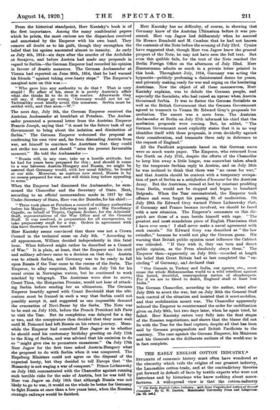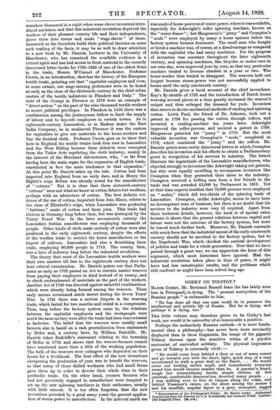Int EARLY ENGLISH COTTON INDUSTRY.* S'ruromrs of economic history must
often have wondered at the obscurity which veils the origins of our greatest industry, the Lancashire cotton-trade, and at the contradictory theories put forward in default of facts by textile experts who were not historians and by historians who knew nothing about manu- factures. A widespread view is that the cotton-industry
• The Early English Cotton Industry : with Some Unpublished Leases of Samuel Crompton. By 0. W. Daniels. Manchester University Press and Longman'. Via 6d. meta somehow blossomed in a night when some clever inventors intro- duced machines, and that this industrial revolution deprived the workers of their pleasant country life and their independence, drove them into towns and made " wage-slaves " of them. Inasmuch as the Socialists build their political theories on some such reading of the facts, it may be as well to draw attention to a new book by Mr. Daniels, Lecturer in the University of Manchester, who has examined the available evidence in a critical spirit and has had access to fresh material in the recently discovered letter-books for 1795-1835 of one of the oldest firms in the trade, Messrs. M'Connel of Manchester. Professor Unwin, in an introduction, sketches the history of the European textile trade, pointing out that " capitalist employers and even, to some extent, our wage-earning proletariat were to be found as early as the close of the thirteenth century in the chief urban centres of the textile industries in Flanders and Italy." The riots of the Ciompi in Florence in 1378 were an example of " direct action " on the part of the nine thousand textile workers to secure political privileges. In Flanders in 1453 there was a combination among the journeyman fullers to limit the supply of labour and to boycott employers in certain towns. As in eighteenth-century Lancashire, or in Madras under the East India Company, so in mediaeval Florence it was the custom for capitalists to give out materials to the home-workers and buy the finished cloth. Professor Unwin goes on to show that here in England the textile trades took firm root in Lancashire and the West Riding because these districts were exempted from the Tudor Acts regulating the cloth industry, mainly in the interest of the Merchant Adventurers, who, " so far from having been the main organ for the expansion of English trade, constituted in fact the main hindrance to that expansion." At this point Mr. Daniels takes up the tale. Cotton had been imported into England from an early date, and in Henry the Eighth's reign Bolton was already noted for the manufacture of " cottons." But it is clear that these sixteenth-century "cottons" were not whatwe know as cotton fabrics but woollens, perhaps with an admixture of cotton. The first definite evi- dence of the use of cotton, imported from Asia Minor, relates to the close of Elizabeth's reign, when Lancashire was producing " fustians," made of cotton and linen yarn. This trade had thriven in Germany long before then, but was destroyed by the Thirty Years' War. In the later seventeenth century the Lancashire fustian manufacture was employing thousands of people. Other kinds of cloth made entirely of cotton were also produced in the early eighteenth century, despite the efforts of the woollen trade to restrict the home manufacture or the import of calicoes. Lancashire had also a flourishing linen trade, employing 60,000 people in 1713. The county. then, was a hive of industry long before the industrial revolution.
The theory that most of the Lancashire textile workers were their own masters till late in the eighteenth century does not bear critical examination. Mr. Daniels points out that Parlia- ment as early as 1702 passed an Act to restrain master weavers from paying their employees in kind instead of in money, and to check embezzlement of materials on the part of the workers. Another Act of 1749 was directed against unlawful combinations which were already being formed among the weavers. These early unions occasioned much unrest during the Seven Years' War. In 1781 there was a serious dispute in the weaving trade, which lasted for two months and ended in a compromise. Thus, long before the factory system came in, the relations between the capitalist employers and the workpeople were much the same as they were after the trade had been concentrated in factories. The belief that the weavers were usually small farmers also is based on a rash generalization from statements by Defoe and, a century later, by William Radcliffe. Mr. Daniels takes Radcliffe's statement relating to the township of Mellor in 1770, and shows that the weaver-farmers cannot have numbered more than a fifth of the working population. The bulk of the weavers were cottagers who depended on their looms for a livelihood. The first effect of the new inventions cheapening the production of yarn was to benefit the weavers, so that many of those skilled workmen who had small farms gave them up in order to devote their whole time to their profitable trade. On the other hand, yeomen farmers who had not previously engaged in manufacture were tempted to set up the new spinning machines in their outhouses, usually with little success. It is too often forgotten that the new inventions preceded by a good many years the general applica- tion of steam-power to manufacture. In the interval much Use was made of horse-power or of water-power, where it was available, especially for Arkwright's roller spinning machine, known as
the " water-frame " ; but Hargreaves's " jenny " and Crompton's " mule " were employed by many a home spinner before the factory system became dominant. The small man who bought or hired a machine was, of course, at a disadvantage as compared with the capitalist who had many machines. For the progress of invention was constant throughout the later eighteenth century, and spinning machines, like bicycles or motor-ears in
our own day, were improved year by year, so that any particular machine tended to become obsolete in a year or two. The home-worker -thus tended to disappear. The weavers held out longest because steam-power was not successfully applied to looms until the early nineteenth century.
Mr. Daniels gives a lucid account of the chief inventions. Kay's fly-shuttle of 1733 and the introduction of Dutch looms
weaving several pieces at a time greatly increased the weaver's output and thus enlarged the demand for yarn. Inventors then strove to devise mechanical methods of carding and spinning cotton. Lewis Paul, the friend of Dr. Johnson, took out a patent in 1738 for passing the cotton through rollers, and invented a carding-machine ten years later. Arkwright improved the roller-process, and secured a patent in 1769. Hargreaves patented his " jenny " in 1770. But the most valuable invention was Crompton's " mule," completed in 1779, which combined the " jenny " and the rollers. Mr. Daniels prints some newly discovered letters in which Crompton describes his invention and his efforts to obtain a Parliamentary grant in recognition of his services to industry. The letters illustrate the ingratitude of the Lancashire manufacturers, who objected strongly to inventors like Arkwright taking out patents, but who were equally unwilling to recompense inventors like Crompton when they presented their ideas to the industry. Crompton received a trifling sum from a few friends in the trade and was awarded £5,000 by Parliament in 1812. Yet at that time experts testified that 70,000 persons were employed on " mules," which did two-thirds of the spinning trade of Lancashire. Crompton, unlike Arkwright, seems to have been an incompetent man of business, but there is no doubt that his services to the industry were very ill requited. Apart from these technical details, however, the book is of special value because it shows that the present relations between capital and labour were not the outcome of the factory system, but must be traced much further back. Moreover, Mr. Daniels contends with much force that the industrial unrest of the early nineteenth century should not be ascribed to the factory system, but to the Napoleonic War, which checked the natural development of politics and trade for a whole generation. Now that we have passed through a great war, we can appreciate the force of this argument, which most historians have ignored. Had the industrial revolution taken place in time of peace, it might have had less catastrophic results, and the problems which still confront us might have been solved long ago.



































 Previous page
Previous page